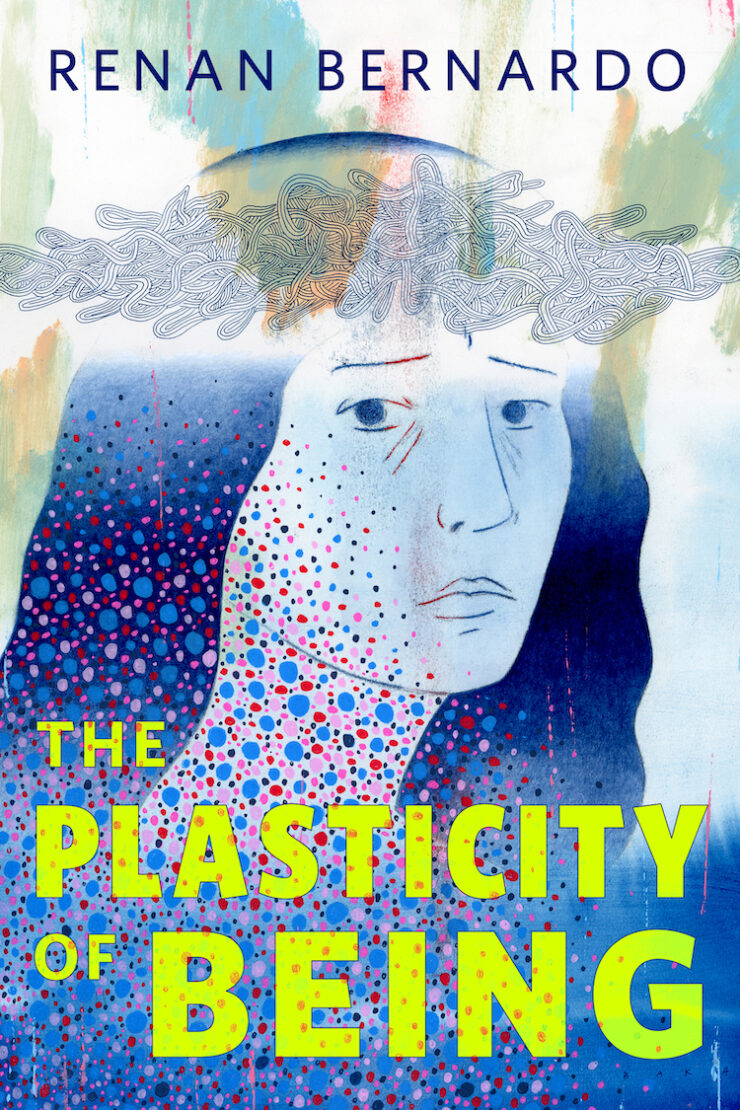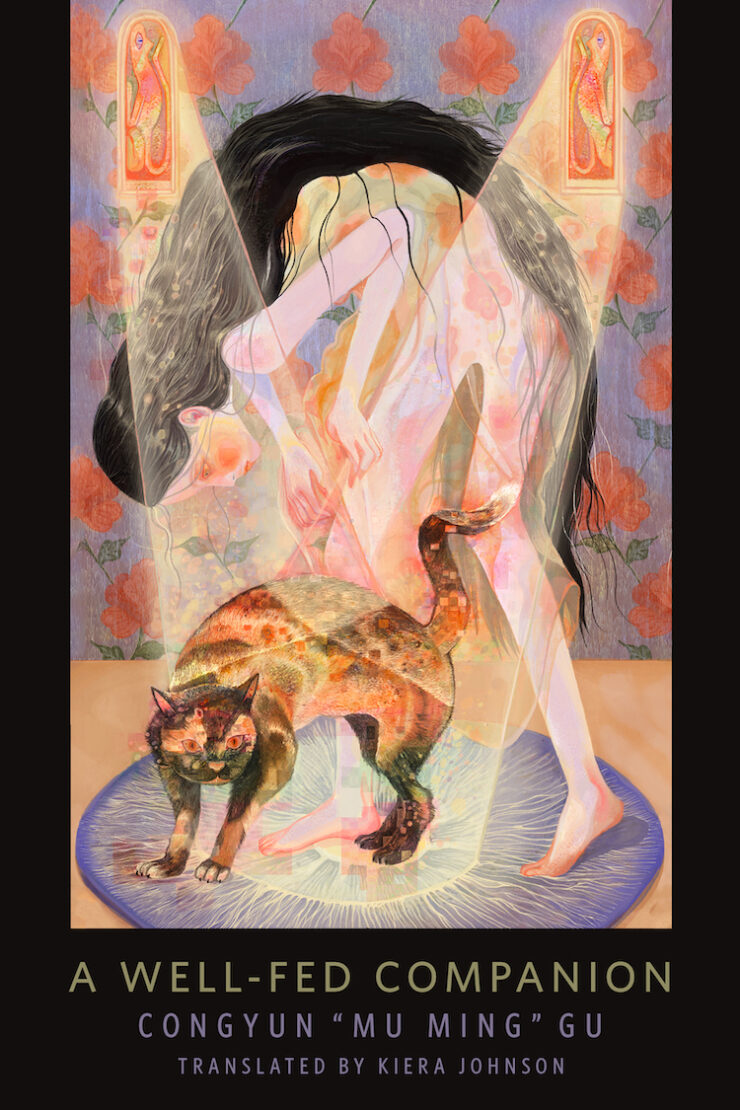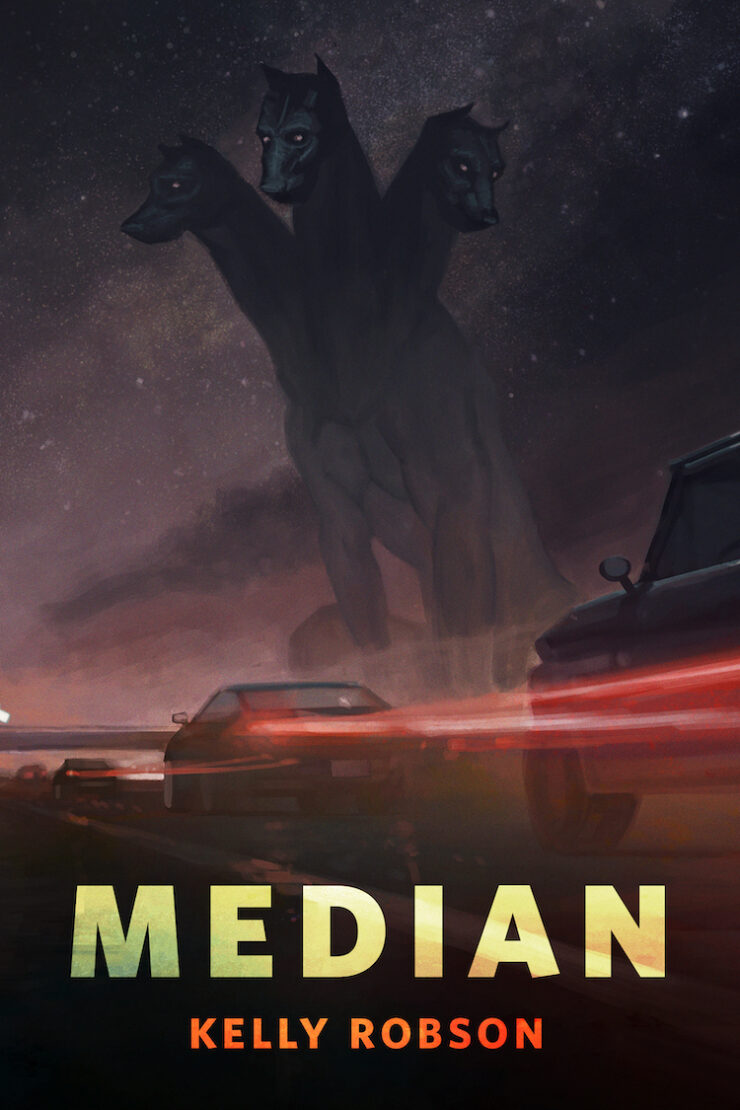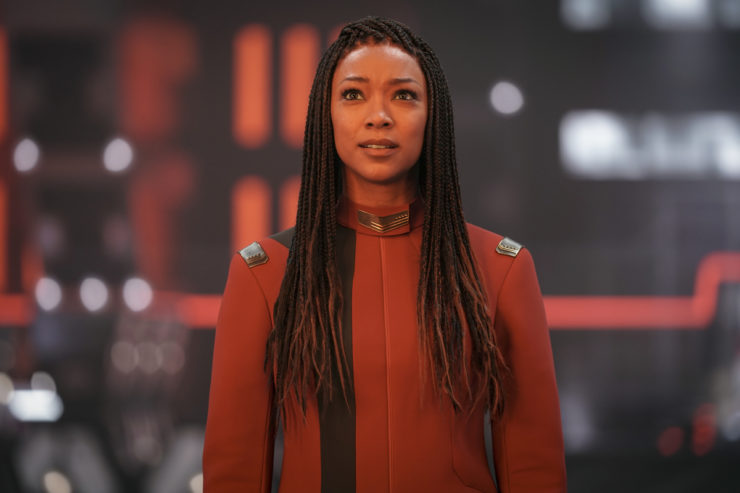Back in 2022, I wrote a newsletter saying that you can love Star Trek: Strange New Worlds without putting down its sister show, Discovery. Which is true! I love both shows a whole lot. I also am obsessed with Lower Decks, which I rewatch pretty obsessively. I have a lot of love for Star Trek: Picard as well. And I’ve grown to appreciate Star Trek: Prodigy greatly since it moved to Netflix. We are truly blessed to have so much amazing Star Trek right now, and there’s no need to pick one show over the others.
And yet, I still feel the need to come out and say it: Star Trek: Discovery is my favorite Trek of the 21st century so far.
The final season of Discovery launched last week, and I’ve been remembering why I adore this show so much. These characters have a special place in my heart, and I’ve been loving the exploration of Starfleet in the 32nd century, centuries after the other Trek shows. Discovery has become a thoughtful, expansive show that asks big, challenging questions, while also being a whole lot of fun.
Minor spoilers for the most recent episodes of Discovery below…
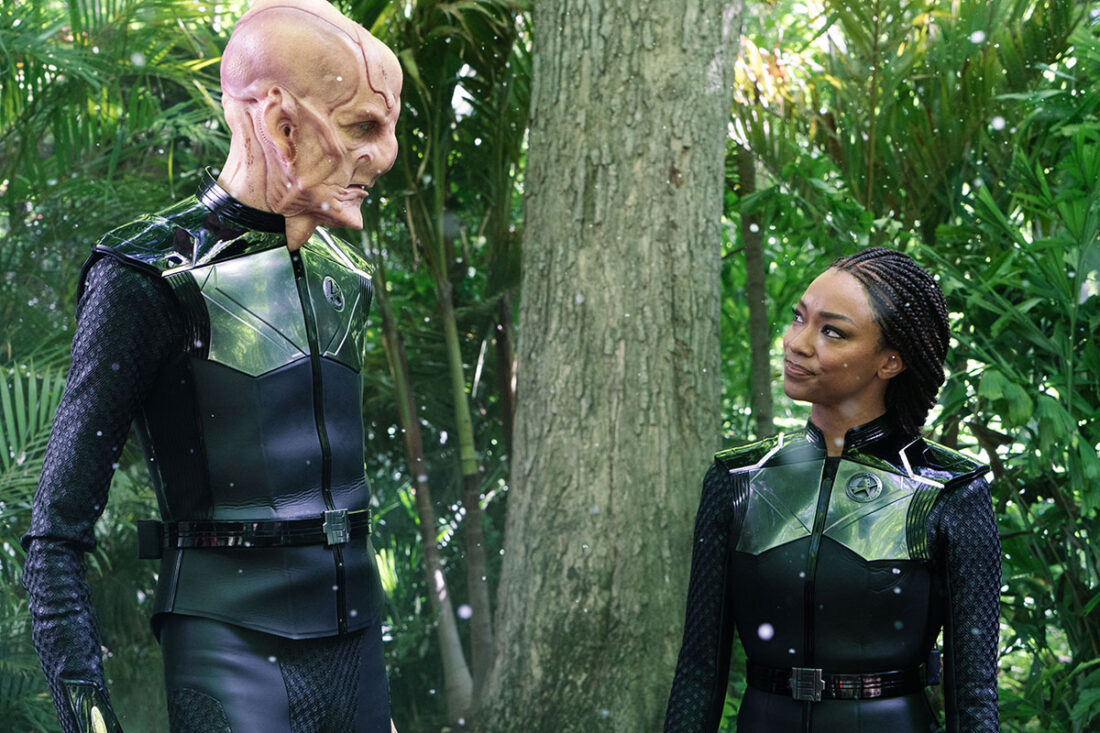
Discovery got off to a rocky start, to say the least. Annalee Newitz and I discussed the first season in the very first episode of our podcast Our Opinions Are Correct, and there was a lot to talk about. Season one leaned into being a war story, something that Deep Space Nine had already done brilliantly, and then veered into the Mirror Universe, which is one of those settings that gets less interesting the more you see of it. The first season featured a lot of upheaval behind the scenes, with co-creator Bryan Fuller leaving early on and the replacement showrunners being let go. Season two served as a backdoor pilot for Strange New Worlds, while also unspooling a somewhat tangled storyline about black ops and A.I. from the future.
Much like Star Trek: The Next Generation, Discovery really hit its stride in its third season. That’s when the crew of the Discovery traveled forward into a far more distant future than Star Trek had ever explored before. The show gained a new lease on life and the Federation felt wide open once again, with so many new places and ideas to explore.
Season three of Discovery tells a nuanced, brutal story about rebuilding the Federation after a huge setback—and questions how far our heroes are willing to go restore what has been lost. Season four is a rich story of first contact, in which aliens from outside the galaxy have unknowingly unleashed an anomaly that threatens civilized worlds, and we have to learn to communicate with them before it’s too late. Season five, without going into too much detail, is following up one of the most tantalizing stories from TNG, about the Progenitors, those ancient humanoids who seeded the galaxy with humanoid life long ago.
(Side note: this trope of ancient humanoids who spread their DNA around the galaxy is sorta adjacent to all those “Ancient Aliens” memes. It seems to emerge from Chariots of the Gods by Erich von Däniken, and it inspired the movie Prometheus as well. A huge part of my young-adult novel Victories Greater than Death is my attempt to deconstruct and subvert this trope, by having my ancient superscientists turn out to be basically eugenicists who wanted to breed humanoids to be part of a bizarre weapon. I originally wanted to have everyone refer to my ancient beings as the First Humanoids, but the She-Ra cartoon introduced some ancient creatures called the First Ones. So I decided to change them to the Shapers, which was honestly a little bit less catchy.)
Anyway, at this point, I should probably lay out some criteria. What makes for a good Star Trek show, in my view?
There are a few elements that seem really important. I love Star Trek when it explores humanism, using huge cosmic stories to show the resilience and ingenuity of human beings, and to explore what it means to be human. Exploration feels like a key part of Star Trek‘s DNA as well: not just traveling to places where no human has gone, but also finding vastly different forms of life and learning to understand creatures who are nearly incomprehensible at first glance. Finally, I like Star Trek when it explores the relationships among the crew, and lets us see how they help each other to grow and reach their full potential, something that Gene L. Coon was keen to explore on the original series and which became a key element in TNG.
Resilience and ingenuity have been at the core of Discovery, especially since the third season. The crew are forced to grapple with a radically different future, one in which the Federation has suffered some huge setbacks, and they use their wits and pure inventiveness to help the Federation rebuild and regain its ability to travel at warp speeds. The fight against the oppressive Emerald Chain, which enslaves people and exploits whole worlds, includes many temptations to compromise the Federation’s values, and it’s gripping to watch our heroes struggle to stay true to their beliefs.As mentioned above, Discovery’s storylines have also involved the struggle to understand creatures whose way of thinking and communicating is vastly different from our own, which forms the climax of season four.
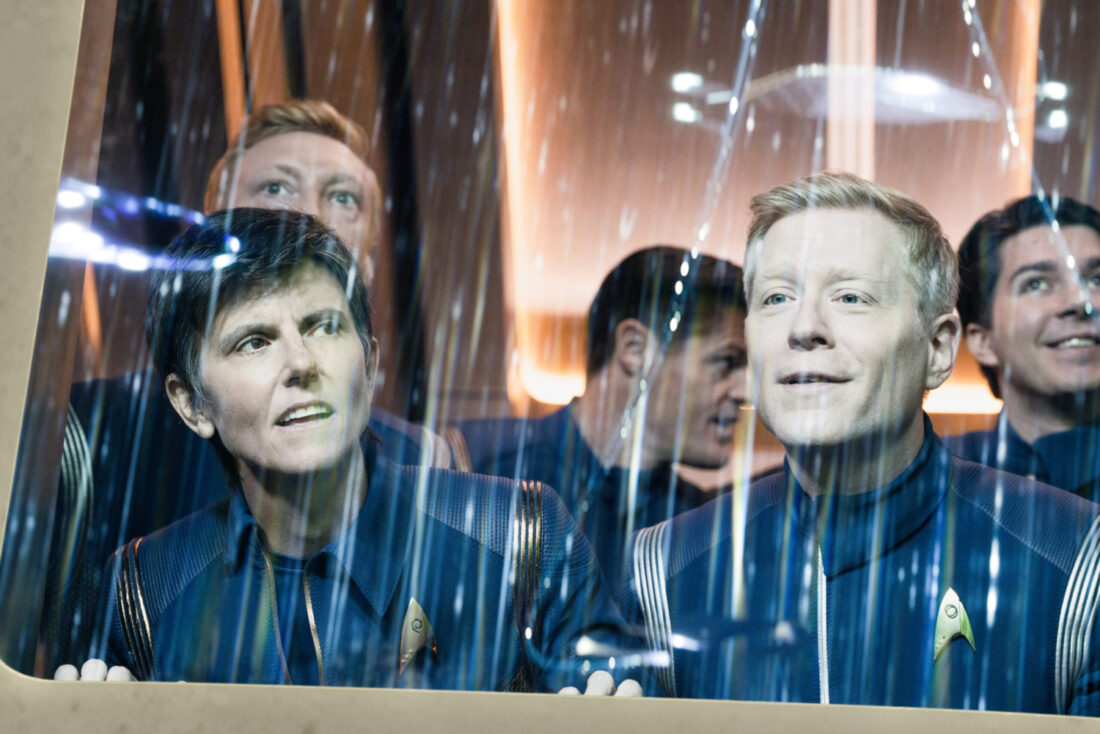
At this point, Discovery has a robust cast of science geeks. Engineering is actually getting a bit crowded, what with Stamets, Adira, and sometimes the wonderfully deadpan Jet Reno all standing around being geniuses—and that’s before you add Tilly, who is capable of being an absolute science mastermind in her own right. If you missed all those scenes in TNG where Data, Geordi and the other crew debate scientific problems and technical solutions, then Discovery has been serving up huge chunks of catnip for quite some time now.
A lot has been written about just how gay Discovery really is, from Stamets and Culber’s marriage to the T4T relationship of Gray and Adira to Tilly’s lesbian fungus fling. Plus, again, there’s Jet Reno. But the thing I really love about Discovery, going into its final season, is just how much beautiful romance there is across the board in this show—even besides the stuff I just mentioned. Saru has been having a whirlwind courtship with T’Rina, the president of Ni’Var, which is the reunified Vulcan and Romulan homeworld. And Captain Michael Burnham has a stormy on-again-off-again love affair going with Book, a smuggler she met when she first arrived in the 32nd century—I’m really rooting for those two to work out their problems, because they have ridiculous chemistry. I’m not used to seeing Star Trek put romance front and center for so many of its major characters, and I love it.
Finally, the thing I love about Discovery is how its characters have been allowed to change and grow, something the first two episodes of season five take great pains to remind us of. Out of the characters who’ve been there since the first season, none of them is the same person they used to be, and we’ve gotten to see them evolve over time. In particular, there’s a huge emphasis on redemption arcs, which is a subject close to my heart. Michael Burnham starts Discovery as a disgraced mutineer, and is now a highly respected captain with a twinkle in her eye. But a lot of these characters have been allowed to make terrible mistakes and learn from them, becoming better people as a result.
When people call Star Trek an optimistic show, I don’t think they’re just talking about fancy technology. I believe Star Trek’s true power is its optimism about people: our ability to keep being better than we were, and to choose kindness and understanding over brute force. More than any other Star Trek show right now, Discovery exemplifies this belief in our potential as a species, which is something that I personally really need right now.
This article was originally published at Happy Dancing, Charlie Jane Anders’ newsletter, available on Buttondown.


